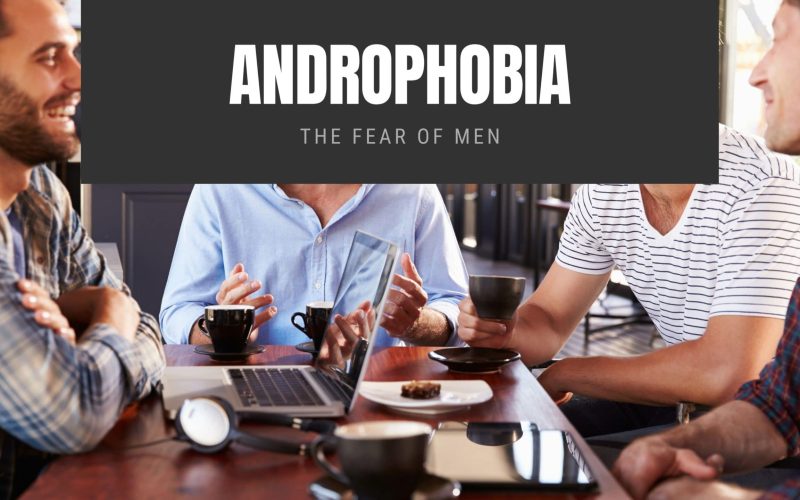Androphobia is a term used for the fear of men. The term wasn’t used until it originated inside the feminist and lesbian-feminist movements as a way to balance the name “gynophobia,” which is the opposite of androphobia and means fear of women.
Misandry is a term that has been confused with androphobia, but both words mean two different things.
Misandry, just like androphobia, stemmed from the feminist and lesbian-feminist movements and means hatred of men.
Misogyny is the opposite of misandry, and it means a hatred of women. While it may seem like androphobia is a gender-specific fear, both men and women can be affected by it.
Symptoms of Androphobia
The symptoms of androphobia include the following:
- A sudden, intense fear, panic, or anxiousness at the thought of the sight of men
- Conciseness that your fear of men is unrealistic or irrational, but you feel completely powerless over it.
- The anxiety that gets more intense when a man attempts to make physical contact with you
- Deliberate avoidance of men or places where you might come in contact with men or feeling intense fear or worry in situations where men are present
- Trouble living your everyday life out of fear of seeing or interacting with men
- Physical manifestations of your fears in the form of sweating, difficulty breathing, rapid heartbeat, and chest tightness
- Dizziness, nausea, or fainting when thinking about men or near men.
- In young children, androphobia may be displayed as tantrums with crying, clinging, or a refusal to leave the side of a female parent or go anywhere close to a man.
What Causes a Person to Develop Androphobia?
Androphobia is categorized as a specific phobia because it is an obviously irrational and overpowering fear of something “specific.”
In this case, the object of freight is men — who don’t naturally pose any real danger but still cause anxiety and avoidance behaviors in some people.
Just like other specific phobias, androphobia is long-lasting and can affect a person’s ability to carry out simple daily activities like education, work, shopping, and even social relationships.
The specific cause of androphobia is yet to be well understood. However, experts have identified some possibilities, including:
- Negative experiences with men in the past, such as emotional abuse, rape, mental or physical abuse, physical assault, sexual harassment, or neglect.
- Your environment and genetics, which may include learned behavior
- Changes in how the brain functions
- Some individuals stand a higher risk of dealing with androphobia than others. The people most at risk include:
- Relatives who have dealt with phobias or anxiety
- Children
- An inhibited, sensitive, or detrimental personality or temperament.
- Past traumatic experience with men
- Hearing stories about negative experiences people have had with men from other people.
When Should You See a Doctor?
Androphobia may begin as a little discomfort or annoyance, but it may grow into a hindrance to your everyday life.
Make sure to see your doctor if your androphobia is causing anxiety and affecting your daily routine negatively.
- Negatively affecting your performance at work or school
- Causing harm to your social relationships or your ability to interact with other people
- Interfering with your daily activities
Depending on the severity of your manifestations, your doctor may have to refer you to a mental health professional.
Any suspected case of androphobia in kids must be addressed. Sometimes, it is normal for children to outgrow their fears, but we can’t be sure if that’ll happen.
But androphobia can harm a child’s ability to function in school and amongst people. A child’s fear of men must be addressed by parents and with professional medical help.
If you talk to your doctor about getting screened for androphobia, he or she will need to talk about your symptoms and psychiatric, medical, and social history.
Your doctor will also need to carry out a physical examination to rule out any emotional or physical problems that might be responsible for your triggers.
If your doctor thinks you are dealing with androphobia or any other anxiety disorder, you will be referred to a mental health professional for proper attention.
How is Androphobia Treated?
There are many ways to treat androphobia. Most people who are dealing with androphobia may recover via therapy sessions.
The primary treatment for androphobia is talk therapy, also known as psychotherapy. The two most popular methods of psychotherapy used for the treatment of androphobia are behavioral therapy and exposure therapy.
In a few cases, medications are also used as a treatment for androphobia.
Exposure Therapy
Exposure therapy is specifically designed to change how you respond to men. You will gradually and repeatedly be exposed to the things that you mentally associate with men.
And eventually, you will be made to interact with a real-life man. Over time, these gradual exposures should help you manage the thoughts, feelings, and sensations associated with your fear of men.
For example, your therapist might first show you photos of men and then make you listen to voice recordings of men.
After that, your therapist will have you watch videos of men and then have you slowly approach a real-life man.
Cognitive-behavioral Therapy (CBT)
Cognitive-behavioral therapy is used for the treatment of different phobias. It uses both exposure therapy and other therapeutic techniques to condition you to view men differently and overcome your fear of men.
During your CBT sessions, your therapist will teach you how to:
- Cope with the physical symptoms and bodily sensations connected with your fear
- View your phobia of men differently.
- Emotionally tackle the impact your concern for men has had on your everyday life.
CBT sessions are always helpful as they equip you with confidence or mastery of your feelings and thoughts instead of feeling overpowered by them.
Medications
Psychotherapy is known to be a very successful way to treat androphobia. But it is sometimes helpful to include medicines in the treatment process.
Medication can reduce the feelings of panic or anxiety that is associated with androphobia. These drugs should be used at the start of treatment to help you recover fast.
Another appropriate use of medications is for short-term, infrequent situations where your anxiety may stop you from doing extraordinary things, such as having a man give you medical attention or going to the emergency room.
Medications commonly used for the treatment of androphobia include:
- Beta-blockers: Beta-blockers are used to control the results of anxiety-induced adrenaline in a person’s body. Adrenaline can cause discomfort, and sometimes dangerous, physical symptoms such as increased blood pressure and heart rate, trembling voices and limbs, a pounding heart.
- Sedatives: Benzodiazepines will help you feel calmer and reduce your anxiety. These medications must be taken carefully because they can cause dependence. For people who have a history of drug abuse or alcohol dependence, benzodiazepine use must be avoided.
What is the Outlook for Androphobia?
Androphobia may not be the most common phobia, but it can negatively affect a person’s quality of life.
Possible complications associated with androphobia include mood disorders, social isolation, suicidal thoughts or attempts, and substance abuse. You must seek the help of a professional if you need it.





The fear of men is the one of the most rare phobia that exist in this fundamental world. In this post I loved the way you explained the practical tactics to deal with the fear of women. I got to know the reasons for which aa woemn is fearful of men. Such a complete post about the fear of women. Keep sharing the wonderful knowledge out there